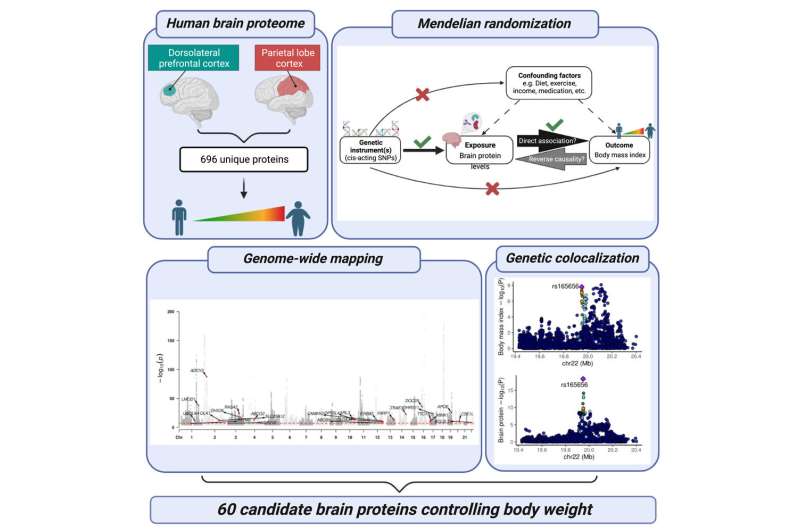This article has been reviewed according to Science X's editorial process and policies. Editors have highlighted the following attributes while ensuring the content's credibility:
fact-checked
peer-reviewed publication
trusted source
proofread
Dozens of brain proteins may play a critical role in body weight regulation

Genetic factors could contribute to up to 50%–75% of the variance in body mass index, or BMI, in the population.
By analyzing the genome of more than 800,000 people of European descent, a research team from Université Laval and the Quebec Heart and Lung Institute Research Center has identified 60 unique proteins expressed in the brain that may be critical regulators of body weight.
This study explored the link between genetic regions associated with body weight and the proteins expressed in the brain. "Previous study showed that hundreds of genetic regions influence body weight. In most cases, the function of these genes remains unknown. Our study reports that about 60 of these genes encode proteins that could influence body weight via their expression in the brain," says Éloi Gagnon, a doctoral student in clinical and biomedical sciences at the Université Laval Faculty of Medicine and first author of the study published in iScience.
For the study, the research team focused on a brain region that could influence food reward sensitivity, such as the pleasure felt when eating fatty or sugary food, as well as cognitive processes including decision-making and memory. This brain region, the dorsolateral prefrontal cortex, is also thought to be implicated in appetite and satiety.
The team's results support the hypothesis that the brain plays a critical role in body weight regulation. This discovery could explain why BMI varies significantly from one person to another.
Lead author Benoît Arsenault, professor at the Université Laval Faculty of Medicine and researcher at the Quebec Heart and Lung Institute, points out that several myths remain in the public domain regarding the impact of genetic factors on body weight. "I often hear that genes cannot explain why the average weight of the population has increased over the past 40 years when our genes have not changed," he says.
Genetics and the food environment
According to the researchers, the evolving food environment may have influenced food behaviors and energy storage capacity over the last few decades. "Individuals with a genetic predisposition to an elevated body weight have a higher weight than before, whereas individuals who do not have this predisposition were thin before and are still thin today," adds Professor Arsenault.
The team believes that the biological role of these proteins in various parts of the brain and their contribution to energy homeostasis, i.e., the balance between food intake and energy expenditure, needs to be studied in more detail. "Overall, the results of our study support the existence of a potential interaction between the brain proteome and the evolving food environment. This relationship could influence eating behaviors and energy storage," says Professor Arsenault.
He stresses that people living in larger bodies are often victims of prejudice and may experience discrimination, intimidation, or stigmatization. These phenomena associated with fatphobia could have repercussions on physical and psychological health. The researcher also notes that several studies have shown that factors beyond our control, such as genetics, account for an important proportion of body weight variation across the population.
"Weight is not a choice. Neither is it a lifestyle habit. We don't have elevated body weight because we are lazy or lack willpower. Unconscious neuronal mechanisms are at play. The brain is the one in charge. I hope that the results of this study can partly explain why body weight varies so much from one person to another," concludes Benoît Arsenault.
More information: Eloi Gagnon et al, Genetic control of body weight by the human brain proteome, iScience (2023). DOI: 10.1016/j.isci.2023.106376





















